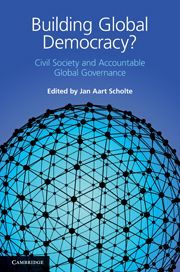Book contents
- Frontmatter
- Contents
- List of figures
- Participants in the Gothenburg Workshop
- List of contributors
- Editor's acknowledgements
- List of abbreviations
- Introduction
- 1 Global governance, accountability and civil society
- 2 Civil society and accountability of the United Nations
- 3 The World Bank and democratic accountability: the role of civil society
- 4 Civil society and IMF accountability
- 5 Civil society and the WTO: contesting accountability
- 6 Civil society and accountability in the Commonwealth
- 7 The Organisation of the Islamic Conference: accountability and civil society
- 8 Civil society and patterns of accountability in the OECD
- 9 Civil society and G8 accountability
- 10 Structuring accountability: civil society and the Asia-Europe Meeting
- 11 Civil society and accountability in the global governance of climate change
- 12 Civil society and accountability promotion in the Global Fund
- 13 Accountability in private global governance: ICANN and civil society
- 14 Civil society and the World Fair Trade Organization: developing responsive accountability
- Conclusion
- Bibliography
- Index
5 - Civil society and the WTO: contesting accountability
Published online by Cambridge University Press: 05 June 2012
- Frontmatter
- Contents
- List of figures
- Participants in the Gothenburg Workshop
- List of contributors
- Editor's acknowledgements
- List of abbreviations
- Introduction
- 1 Global governance, accountability and civil society
- 2 Civil society and accountability of the United Nations
- 3 The World Bank and democratic accountability: the role of civil society
- 4 Civil society and IMF accountability
- 5 Civil society and the WTO: contesting accountability
- 6 Civil society and accountability in the Commonwealth
- 7 The Organisation of the Islamic Conference: accountability and civil society
- 8 Civil society and patterns of accountability in the OECD
- 9 Civil society and G8 accountability
- 10 Structuring accountability: civil society and the Asia-Europe Meeting
- 11 Civil society and accountability in the global governance of climate change
- 12 Civil society and accountability promotion in the Global Fund
- 13 Accountability in private global governance: ICANN and civil society
- 14 Civil society and the World Fair Trade Organization: developing responsive accountability
- Conclusion
- Bibliography
- Index
Summary
I will devote a considerable part of my time after this Conference to try to improve information and dialogue with the civil society, taking into account the point of view of all the WTO Members, and the rules which you have given to me.
(Renato Ruggiero, 1998)I believe we have made real progress in our efforts to enhance the WTO's image and engage civil society. We are reaching out to NGOs through regular seminars and symposia … We are also seeking to encourage a greater level of engagement from business leaders, trade unions and other sectors of civil society.
(Mike Moore, 2002)There can be no doubting the fact that we can improve in all areas of our work including … improving our links … with civil society.
(Supachai Panitchpakdi, 2005)As the Doha Round progresses it is vital that the WTO continue to engage civil society. For me, civil society and governments are both important interlocutors.
(Pascal Lamy, 2005)Introduction
As the quotations above indicate, every Director-General of the World Trade Organization (WTO) has made positive rhetorical gestures concerning the importance of civil society. In this respect leaders of the principal global governance agency for trade have spoken much like managers of the UN, World Bank and IMF discussed in the preceding chapters. Nevertheless, the relationship between civil society actors and the WTO has been a contentious matter since the inception of the organisation.
- Type
- Chapter
- Information
- Building Global Democracy?Civil Society and Accountable Global Governance, pp. 105 - 127Publisher: Cambridge University PressPrint publication year: 2011
- 6
- Cited by

